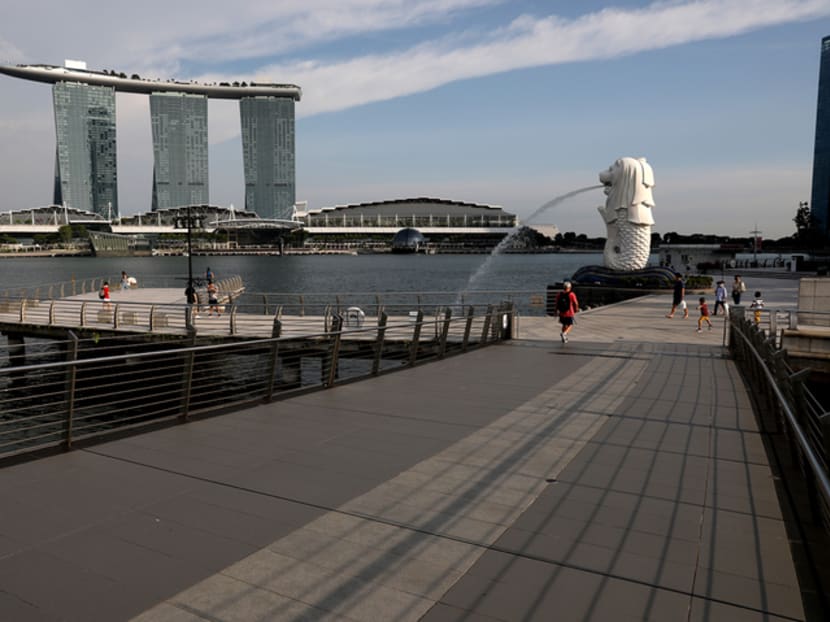Singaporeans unaware of serious threat of foreign influence operations: Shanmugam
SINGAPORE — Subversion, through the use of foreign influence operations by other countries, is one of the most serious threats faced by Singapore, but Singaporeans are unaware of this, said Home Affairs Minister K Shanmugam in Parliament on Monday (Oct 4).

Home Affairs Minister K Shanmugam told Parliament on Oct 4, 2021 that few Singaporeans were aware of the serious threat posed to the nation by foreign influence operations.
- Home Affairs Minister K Shanmugam believes foreign interference in local politics is one of Singapore’s most serious threats
- But not many Singaporeans, including MPs, are fully aware of the threat
- In his opening speech on a draft foreign interference law, he gave several examples, here and overseas, of how influence operations have been used
- Such propaganda is not obvious, but it conditions people to think in certain ways, said Mr Shanmugam
- Singapore’s racial and religious mix is easily exploitable and the Government is already seeing a “steady buildup” of such narratives
SINGAPORE — Subversion, through the use of foreign influence operations by other countries, is one of the most serious threats faced by Singapore, but Singaporeans are unaware of this, said Home Affairs Minister K Shanmugam in Parliament on Monday (Oct 4).
In his opening speech on the debate over the Bill to enact the Foreign Interference (Countermeasures) Act, or Fica, Mr Shanmugam gave a long list of recent influence operations around the world carried out by countries such as the United States, Russia and China.
“Spying, subversion in another country is age old, using spies, agents, locals and useful idiots,” said Mr Shanmugam.
“Now, the tech has evolved again and the internet has created a powerful new medium for subversion,” he added.
INFLUENCE OPS KEEP TARGET NATION IN CONSTANT TURMOIL
He then cited the Gerasimov doctrine, purportedly conceived by a Russian general.
The doctrine maps out how a society’s issues can be subverted by information operations to polarise society and incite public disorder, with the intent to keep the target country in a constant state of turmoil so that aggressors can achieve their political and military aims.
“Countries are actively developing attack and defence capabilities as an arm of warfare, equal to and more potent than their land, air and naval forces,” said Mr Shanmugam, who is also the Law Minister.
Documents were then distributed to Members of Parliament present that set out the hostile information campaigns used by other countries, according to reports as well as submissions to Singapore’s parliamentary select committee on deliberate online falsehoods in 2018.
Mr Shanmugam noted how Russia, for example, had targeted Ukraine during national protests in 2014 by exploiting sensitive fault lines to paint its government as fascist, racist and xenophobic, in order to weaken its military and population for Russia’s annexation of the Crimea region later on.
Russia also managed to subvert the Czech Republic’s foreign policy and the Netherlands’ referendum on the Ukraine issue through such operations.
While the Western media often names China, Iran, Russia and North Korea as originators of such operations, Mr Shanmugam said Western countries such as the US and the United Kingdom also possess similar, or perhaps even superior, capabilities.
He pointed to Operation Rubicon, a partnership between US and Germany’s intelligence agencies that has been called one of the most successful intelligence operations. The operation allowed them to read encrypted communications of their allies and adversaries through technology by rigging devices sold by a Swiss provider.
“There are no angels in this game,” he said.
“Have the Americans actually stopped? We can only guess. But it's now got to be taken as a given that this sort of thing will be done regularly, and everyone will face this. And it has become very easy and inexpensive to do,” added Mr Shanmugam.
SINGAPORE HAS BEEN TARGETED
Singapore has faced such operations originating from a foreign country, such as the cyberattack on SingHealth’s databases in 2018, he said.
Between 2016 and 2017, Singapore also experienced a coordinated hostile information campaign that tried to undermine the country’s foreign policy position, through many online commentaries and videos on previously dormant social media accounts.
Mr Shanmugam, who did not name the aggressor, said: “Many of these were in Mandarin and targeted our Chinese-speaking population; these contents were also widely circulated via chat apps and aim to influence sentiments among Singaporeans.”
And in 2018, there was also a large spike in online comments critical of Singapore from anonymous accounts during a period of bilateral tension with another unnamed country.
“I will say so far, these (attempts) have been relatively low level, except the strategic move — the attempts to condition our people's thinking, which is going on,” he said.
He then noted how a French report last week said Singapore was resilient and well-prepared against such influence operations, despite vulnerability arising from its size, connectivity and multicultural society.
“I am not (as) sanguine as the people who wrote this report,” said Mr Shanmugam. “Our racial and religious mix is easily exploitable by different countries and we see a steady buildup of different narratives which is being cleverly done.”
Such propaganda is not obvious, but it conditions people to think in certain ways, especially on foreign policy issues and often appealing to a larger racial identity beyond the Singaporean one, said Mr Shanmugam.
“Our population, and I think most Members of Parliament, are not really aware of this,” he added.
Fica thus proposes to defend Singapore’s domestic politics against foreign interference, said Mr Shanmugam.
“The philosophy is that our politics is for Singaporeans to deal with. We can argue, disagree, but ultimately it is for us to decide,” he said.











